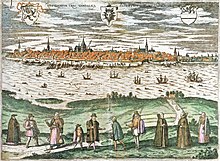Hundred Men College
The Hundred Men College was a civic council founded in 1583 in the Hanseatic city of Rostock .
prehistory
The efforts of the Rostock Council to completely withdraw from the influence of the Mecklenburg ducal house and to become a free imperial city after the attainment of coinage justice in 1325 and full jurisdiction in 1358 , led to disputes with the duke again and again since the city was founded. In addition, the Duke made use of the inner-city opposition groups, which were mainly made up of unsanitary craftsmen, to sow disputes in the city. The opposition groups arose due to the structure and composition of the Rostock Council. Here a sovereignty ruled the ancestral patrician families, some of whom provided councilors and mayors from their ranks for decades, the posts were often downright inherited. When a councilor in office for life died, a new councilor was chosen by the council itself from their families. The 15th century began a period of unrest in the city that lasted nearly two hundred years. The development of the city was also successful through the Hanseatic League and the offices of the craftsmen pushed for a possibility of participation. First and foremost, the opposition's goal has always been to create committees or a citizenry to accompany the council. Following the example of Lübeck, a citizens' letter was wrested from the council in 1408. In this the considerable land ownership of the council families in the Rostock area was criticized as well as the gender role and the marriage circle of the leading patrician families.
Sixties committees
In 1410 the council was deposed by a sixties committee and council election regulations were issued. In this an annual election and the occupation of a third of the seats in the council for the craft offices was determined. As early as 1428 there were new disputes directed against the families of the patricians. This time, too, a sixties committee appeared, each made up of 30 craftsmen and 30 businesspeople. The conflict was settled in 1439 through pressure from the Hanseatic League and foreign policy circumstances. Rostock suffered renewed unrest from 1487 to 1491 when the duke wanted to increase his influence on the city by founding a collegiate monastery at the Jakobikirche . This led to violent clashes that went down in history as the Rostock cathedral feud.
Sixty-four
A further step towards the formation of a citizenship was the defeat of the city of Lübeck suffered in the count feud of 1534 and the associated war burdens that Rostock also had to bear. A citizens' committee formed on June 14, 1534 had to be recognized by the council. The tradition was taken up and 64 members were appointed, half of them merchants, including many brewers, and artisans. The urban lower classes were still not represented. Sixteen elders formed a group representing the sixty-four. This was occupied by nine merchants and seven craftsmen. Due to the failure of the military efforts of Duke Johann Albrecht in Scandinavia with the associated lack of money for the sovereign, the hostilities between the city and the duke increased. High demands for money from the council for the ducal university and the promise of the mayor for a payment led to its removal and in 1560 to the establishment of a committee of sixteen with members elected by the council and the equal status of the sixties, which led to dual rule until 1565. On May 11, 1563, the sixties passed the Formula concordiae , with which the responsibility between the university and the duke was reorganized.
Inheritance contracts
The situation came to a head when a member of the sixties was arrested by the council and he was forcibly released, as well as suspicions by the citizens that members of the council were working with the duke. As a result, Duke Johann Albrecht moved to the city on October 28, 1565, destroyed the citizens' letter and dissolved the sixties. The stone gate was torn down and a kennel was built in front of the city. After the Baltic Sea access was blocked in Warnemünde , the council was forced to recognize the duke's sovereignty and in 1573 the First Rostock Inheritance Treaty was signed.
The story repeated itself under Duke Ulrich in 1584, again the town was forced to conclude a second inheritance contract by the threat of blocking the Warnow.
Founding of the Hundred Men College
At the same time, a permanent citizenship was formed on December 31, 1583 with the Hundred Men College. Members were 40 craftsmen each, mainly from the trades shoemaker, blacksmith, baker and woolen weaver, 40 brewers and 20 merchants. The representatives of the craftsmen were mostly the senior citizens of the offices ( guilds ). The college was divided into four quarters with 25 equal members. With the establishment of the college, the political situation in the city was pacified and stabilized. The relationship between the council and the community was thus balanced and Rostock began an economic and cultural boom. Since the lower classes of the population were still not represented in this body, there were no great social differences within the council and the college; the ratio had even shifted further in favor of the upper class. At the end of the 16th century, a committee of sixteen was re-elected as a select committee, in which two brewers, a merchant and a craftsman sat from each quarter. In addition to the advantage of a broader co-determination, the college often had the disadvantage of delaying resolutions when large parts of the Hundred Man Representatives did not appear at meetings and were sometimes absent for several weeks.
Individual evidence
- Karsten Schröder (Ed.): Within your walls there is unity and general well-being. A history of the city of Rostock from its origins to 1990. Koch, Rostock 2002, ISBN 3-929544-68-7 .
